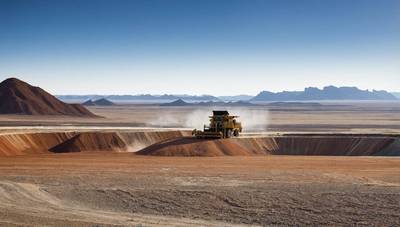Russell: The US-Australian critical minerals deal highlights the gap with China
It is not the game changer needed to reduce Western dependence on China. But it is a first important step.
U.S. president Donald Trump and Australian prime minister Anthony Albanese signed a deal in Washington on Monday that could see up to $8 billion invested in projects for the development and refinement of metals essential to industries such as defence, advanced manufacturing, and energy transition.
The White House touted the agreement in a factsheet with the headline: "Achieving crucial mineral and energy dominance."
You can dismiss this as political hyperbole and spin, given China's dominance in the majority of global supply chains for critical minerals.
China produces 90% of rare earths refined, 90% of graphite and just over 80% of cobalt.
China's share is much lower, but when you add its control over Indonesian nickel refinery to the amount of nickel produced in China, it comes out at around 70%.
The U.S. and Australia agreement shows that Western governments have begun to take steps towards reducing their dependence on China. They are also willing to spend money to achieve this goal.
Seven letters of interest from the U.S. Export-Import Bank for investments of $2.2 billion are the first concrete steps of the deal.
Arafura Rare Earths, which has a mine under construction in Australia's Northern Territory and Sunrise Energy Metals which is working on a nickel and cobalt project in New South Wales, are among the recipients.
The agreement includes assistance for the U.S. aluminium company Alcoa in building a gallium refinery alongside its alumina refining plant in Western Australia. This could provide up 10% of global galium, which is a metal that's used in semiconductors.
DEAL REALISM
The news of the Australia-U.S. agreement was welcomed enthusiastically at the IMARC Conference that began on Tuesday in Sydney. Numerous speakers and delegates said that it was a recognition that the Western World has to do more in order to catch up with China's dominance of refined metals.
One delegate, however, was realistic. He compared the deal with a 400-metre race. China had already completed three-quarters the distance and the West only needed to place its starting blocks.
Even if there was more money invested in developing mining projects, and the processing of ore at mid- and downstream levels, it would still take years for Western buyers to stop buying from Chinese suppliers.
It is unlikely that, even with government capital at a low cost, projects in Australia or other countries could produce metals that are competitively priced to those produced by China.
Western manufacturers and governments will need to pay more for supply chains that do not touch China.
It could be achieved in a number of ways, including by lowering the cost basis of Western companies through deferring mineral royalty payments or tax incentives, or by imposing duties on imported Chinese material.
Considered in its entirety the challenges of building, funding and maintaining critical mineral supply chain outside of China, it is clear that the agreement between Trump and Albanese barely moves the needle.
This could be the beginning of larger deals and commitments. Especially if the public-private partnership era is ushered in, which can speed up the development of refineries and mines.
You like this column? Open Interest (ROI) is your new essential source of global financial commentary. ROI provides data-driven, thought-provoking analysis on everything from soybeans to swap rates. The markets are changing faster than ever. ROI can help you keep up. Follow ROI on LinkedIn, X.
These are the views of the columnist, who is also an author. (Editing by Kim Coghill).
(source: Reuters)





